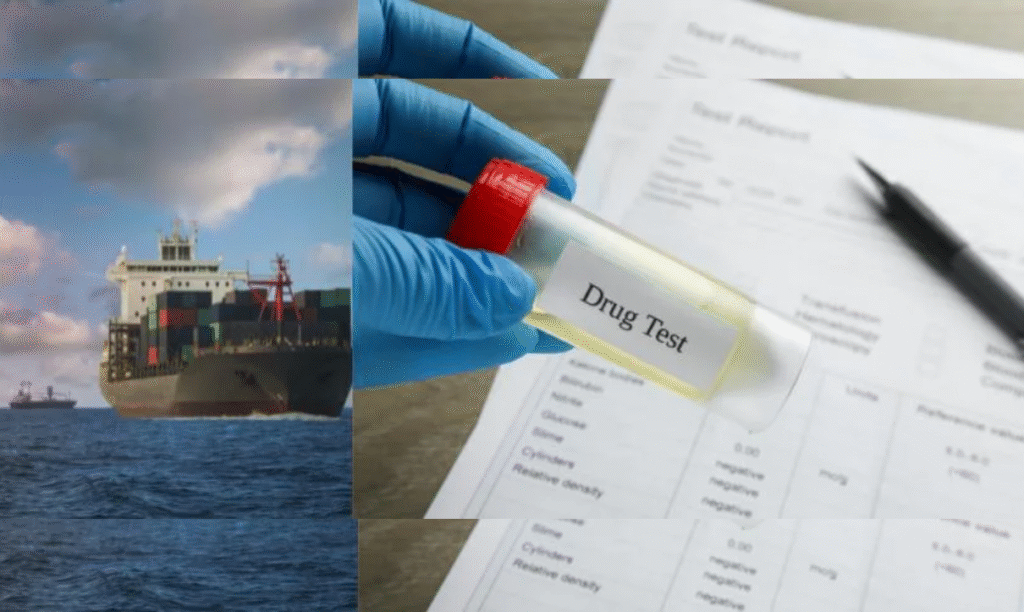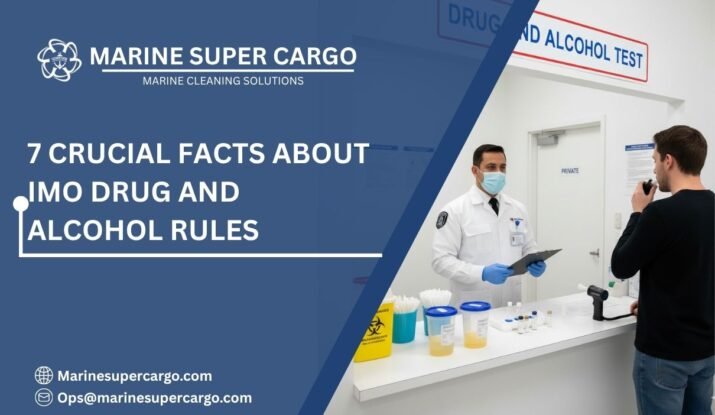Life at sea demands constant clarity, discipline, and vigilance. A single misstep can have far-reaching consequences—for the crew, the vessel, the cargo, and even the surrounding environment. Recognizing these risks, the IMO Drug and Alcohol Rules were established as a global safety framework, ensuring that everyone on board remains alert, fit for duty, and fully committed to safe operations.
For shipowners, managers, and operators, these rules go beyond mere guidelines—they are lifelines that safeguard lives, assets, and reputations. By adhering to these regulations, maritime organizations enhance operational safety, reduce the likelihood of accidents, and maintain compliance with international standards.
This article explores how the IMO Drug and Alcohol Rules play a critical role in promoting safer, more responsible maritime operations.
What Are the IMO Drug and Alcohol Rules?
The IMO Drug and Alcohol Rules outline international standards to regulate alcohol consumption and prohibit drug use among seafarers. They establish clear boundaries to avoid human impairment during critical duties at sea. Think of them as the compass that makes sure crews always stay on course.
Key Elements of the Rules
- Alcohol limits are typically set at 0.05% blood alcohol concentration for watchkeepers.
- Zero tolerance for prohibited drugs.
- Mandatory testing at different stages, such as pre-employment, post-incident, and random.
- Documentation and transparent record-keeping for audits.
They form a framework preventing impaired decisions onboard—a cornerstone of maritime safety.

Why the IMO Drug and Alcohol Rules Matter
Imagine navigating congested waters with even one impaired officer. The results could be catastrophic—collisions, oil spills, or loss of life. The IMO Drug and Alcohol Rules drastically reduce these avoidable risks. Also read about Powerful Reasons Drug and Alcohol Testing Matters.
Benefits of the Rules
- Fewer accidents and unsafe incidents.
- Strong compliance with international maritime law.
- Lower insurance and liability costs.
- Greater trust with stakeholders and ports.
- A healthier, more accountable workplace culture.
By addressing impairment, these rules protect not only people but also fragile marine ecosystems.
The Relationship Between Rules and Maritime Safety
Studies suggest that human error is responsible for 75–80% of maritime accidents. Many are linked to fatigue, alcohol, or drug use. The IMO Drug and Alcohol Rules act as proactive maintenance for humans—the equivalent of checking a ship’s hull before sailing.
Impacts on Operations
- Reduced downtime from accidents and investigations.
- Sharper decision-making when seconds count.
- Fewer environmental spills align with the MARPOL Convention.
- Protection of cargo and reduction of delays.
Safe crews are the bedrock of reliable voyages. The rules ensure crews remain dependable at all times.
Compliance in Global Context
Several international frameworks reinforce the importance of the IMO Drug and Alcohol Rules:
- IMO: Establishes minimum standards for safety and duty fitness.
- MARPOL Convention: Demands the prevention of marine pollution, commonly caused by human mistakes.
- IMCA (International Marine Contractors Association): Fosters a culture of safety and responsibility.
- IAPH (International Association of Ports and Harbors): Supports ports in enforcing unified global practices.
Non-compliance brings port delays, detentions, fines, and serious reputational harm.
Persistent Misconceptions
Some organizations hesitate over testing because of myths:
- “It harms morale.” In fact, clear rules create fairness and trust.
- “It’s too invasive.” Legal protections ensure confidentiality.
- “It costs too much.” The price of compliance is minimal compared to one regulatory fine or accident.
Understanding reality makes it clear—compliance under the IMO Drug and Alcohol Rules saves lives, money, and reputations.
Future of Testing Under the IMO Framework
Technology is making compliance more efficient and less disruptive.
- Non-invasive testing methods like saliva analysis provide quick results.
- AI systems predict fatigue, alertness, and safety risks.
- Blockchain documentation ensures tamper-proof test records.
- Digital integration into Safety Management Systems (SMS): Creates holistic, transparent compliance oversight.
Soon, IMO Drug and Alcohol Rules will be enforced through seamless, predictive systems that enhance both safety and efficiency.
✅ 4 Things to Check for Safety at Sea pic.twitter.com/dAxhJQ2i6U
— Marine Super Cargo (@Marinsupercargo) September 14, 2025
Marine Supercargo Expands Services: Drug & Alcohol Testing for Safer Seas
Marine Supercargo, known worldwide for its advanced marine cleaning services via CleanShip.co, has now expanded into Drug & Alcohol Testing Services. This move reinforces maritime safety by ensuring crews remain fit for duty under the IMO Drug and Alcohol Rules.
By offering professional testing solutions alongside environmental cleaning, Marine Supercargo helps shipowners, operators, and managers stay compliant with regulations set by IMO, IMCA, and the MARPOL Convention. Beyond compliance, the services reduce port delays, prevent costly risks, and uphold international reputation.
This expansion positions the company as a trusted partner for integrated maritime operations—protecting both the crew at sea and the environment they navigate. It underscores that safe sailors and clean vessels are inseparable pillars of sustainable shipping. Learn more about the Surveyor’s role during hull cleaning operations.
Implementing the Rules Effectively
Companies can avoid complexity by weaving the IMO Drug and Alcohol Rules smoothly into operations:
- Write transparent policies based directly on IMO guidelines.
- Train supervisors to enforce rules calmly and fairly.
- Communicate clearly to crews about why adherence matters.
- Build testing into regular safety culture—not as a “gotcha” mechanism.
- Keep accurate, confidential records for audits.
Rules succeed only when seen as shared protection, not policing.

Financial and Operational Gains
Some managers assume compliance is a burden. In reality:
- It reduces the risk of fines and detentions.
- Insurance premiums are lower when operators prove diligence.
- Smooth operations cut costs from disruptions and investigations.
The economics of safety far outweigh the costs of neglect.
Conclusion
The IMO Drug and Alcohol Rules are not mere regulations—they are global safeguards, essential for safe seas, responsible crews, and sustainable operations. They save lives, prevent pollution, and reassure regulators, insurers, and customers.
Key Takeaways:
- Drug and alcohol rules reduce human error and prevent major maritime accidents.
- Compliance ensures smoother, greener, and cost-saving operations.
- Technology will make adherence seamless and smarter in the near future.
To sail safely into the future, explore trusted compliance solutions with CleanShip.co and ensure your crews and vessels are always prepared for duty.
FAQs:
Q1. Why are the IMO Drug and Alcohol Rules important?
They aim to prevent accidents by ensuring all crew members remain sober and alert. This reduces risks to safety, cargo, and the environment.
Q2. How do these rules link to MARPOL?
MARPOL protects oceans from pollution. Many marine accidents caused by impairment lead to spills. Testing ensures vessels comply with both safety and environmental obligations.
Q3. Are these rules costly to follow?
Compliance has minimal costs compared to port delays, lawsuits, or accident-related expenses. In fact, adherence saves money long-term.
Q4. How is testing done under the IMO Drug and Alcohol Rules?
Testing is performed pre-employment, randomly, post-incident, and before returning to duty. Each method ensures constant vigilance.
Q5. Why connect drug testing and hull cleaning?
Both safeguard maritime operations differently: hull cleaning improves efficiency, while drug testing reduces human error. Together, they ensure safer and greener voyages.


